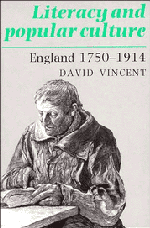Summary
The future of this study is the past which provides the point of departure for Hoggart's classic account, The Uses of Literacy. The generation which went to school in the decades before the First World War grew up to form the culture whose subsequent erosion by mass communication Hoggart sought to analyse. Approached through the perspective of the eighteenth and nineteenth centuries, The Uses of Literacy, which is now over thirty years old, has an air of great familiarity. This is partly because its preoccupation with the exploitation of inexperienced readers by unprincipled capitalists had been current in one form or another since at least the appearance of Matthew Arnold's Culture and Anarchy in 1868. At the very end of the period covered by this book, R. A. Scott-James delivered the following verdict on the consequences of the final drive to mass literacy: ‘a careful observer of the workings of the Education Act [of 1870], basing his judgment upon the circulation of literature, might come to the general conclusion that it was contributing to the intellectual debauchery of the working classes, and that its influence was more subtly deleterious than that of the public house’.
Yet this section of the population, so close to the moral abyss on the eve of the First World War, reappears in the 1930s as the upholders of ‘a decent, local, personal, and communal way of life’ which is to be threatened by forms of journalism and fiction only in their infancy before 1914.
- Type
- Chapter
- Information
- Literacy and Popular CultureEngland 1750–1914, pp. 270 - 280Publisher: Cambridge University PressPrint publication year: 1989



